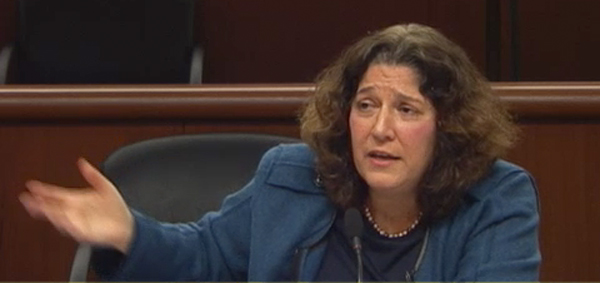Trending
In Albany, title insurers testify that new regulations would kill jobs, raise costs
Department of Financial Services' Maria Vullo said those claims are false

The nation’s most powerful title insurers descended on Albany on Friday for a showdown with Gov. Andrew Cuomo’s administration over the industry’s penchant for showering clients with gifts, fancy dinners and luxury box seats at Yankee Stadium. The hearing could have big implications for how the title insurance firms conduct business and staff their operations.
On one side sat representatives from the “four families” of title insurance, eager to testify in a hearing convened by the state assembly that the practice is essential for conducting business and retaining clients. On the other was Maria Vullo, superintendent of the state’s Department of Financial Services, who is spearheading a crackdown on excessive marketing expenses in the industry.
At the hearing, title insurers argued that a ban on entertaining clients is anti-competitive and threatens jobs. They also said costs would rise for consumers if the ban went through.
“Not true,” Vullo replied, telling Assembly members that she believes the regulations will actually lower insurance rates for homebuyers.
At times contentious, Friday’s hearing was scheduled amid an outcry over DFS regulations that took effect Dec. 18. The rules prohibit title companies from offering clients meals, entertainment and gifts. Just two days after the rules took effect, DFS agreed to delay the implementation until Feb. 1 pending the outcome of Friday’s hearing.
On Friday, Vullo said “there is no place” for companies to win business on the basis of who “can lavish the most expensive gifts, throw the best parties, hand out the best seats to sporting events or socialize with referral sources at strip clubs.”
“These so-called ‘marketing’ expenses are not direct to the consumer, which is part of the problem,” she said.
According to Vullo’s testimony, title insurers wrote $1.1 billion in premiums in New York in 2016. That represented nearly 10 percent of market nationally, which had $11.7 billion in premiums that year, she said. That’s partly because rates are significantly higher in New York — about 40 percent more than Connecticut and 25 percent more than Massachusetts and New Jersey.
“Unfortunately, it’s not just going after a few bad actors. It is a widespread practice of the industry. The fact that everyone does it doesn’t make it legal,” Vullo said. “That’s what we’re addressing.”
But representatives from major insurers, including Stewart Title Insurance Company, Fidelity National Title Group and First American Title Insurance, defended their marketing tactics, arguing that it’s often a perfectly appriopriate business practice.
“[Clients] might want to go to lunch or coffee. With all due respect, they may want to go to a ballpark,” said Steven Day, executive vice president of Fidelity National Title Group. He drew a distinction between what he called prudent expenses and lavish gifts, and urged lawmakers not to “throw the baby out with the bathwater.”
Randall Scott, First American’s senior vice president and general counsel, took aim at what he described as a “complete lack of clarity” in the regulations, which he argued would drive business to New Jersey and Connecticut. “There’s a stadium called MetLife in New Jersey, and our New Jersey colleagues can call in a party and take them to a game in New Jersey,” he said. He also raised the question of compliance. “Absent enforcement, the rules are irrelevant,” he said.
Though Scott acknowledged that title companies host events that some consider lavish, he said large-scale events are often designed as networking opportunities that are beneficial to attendees. If he takes a client out to golf, he uses the outing to solicit feedback on their work together, he said. “We’re doing that not for a quid pro quo, but to develop key relationships and to earn the business of our clients.”
It’s unclear if another hearing will take place or if the Assembly, which is controlled by Republicans, will use Friday’s testimony to determine the fate of the DFS’ rules.




